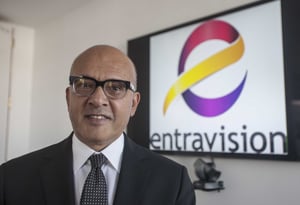Now that Spanish-language TV brings in bigger audiences than English-language competitors, station owner Entravision Communications Corp. of Santa Monica is clawing back from the recession.
Entravision’s comeback is linked closely to the success of the Univision broadcast network, which in July sweeps beat the big four broadcasters for viewers ages 18 to 49 for the first time. Entravision is the largest independent owner of Univision affiliate TV stations. That means ad sales are up.
Entravision also altered its sales model to emphasize cross-selling across its TV, radio and digital properties, which last year helped the company report its first annual profit since 2007. Also, politicians eager to get the Hispanic vote spent millions on ad buys.
The market has taken notice: Company shares have quadrupled from a year ago.
“Investors see and know about the growing Hispanic market,” said Entravision Chief Executive Walter Ulloa. “There’s nothing like success to get investors excited about your company.”
Entravision owns 56 TV stations in markets across the country, most of them Univision affiliates, with many on the U.S.-Mexico border and other areas with large Hispanic populations, such as San Diego and Las Vegas. The company also owns 49 radio stations, many of them in the same markets as its TV properties.
Univision, meanwhile, is attracting audiences on par or better than the ABC, NBC, CBS and Fox networks. They are attracted to its Spanish-language telenovelas, news and sports.
Better ratings mean more advertising revenue for its Univision stations. The company recoups all of the ad revenue for its stations, except for a 9.4 percent fee paid to Univision and a 15 percent fee to ad buyers.
Entravision reported net income of $4.1 million for the first half of the year, up from a loss in the same span a year earlier. Revenue was $106 million, up 5 percent.
The growth is fueled by a booming Hispanic population that has caught the attention of advertisers, especially political candidates and related causes. Awareness of that opportunity peaked after the 2010 U.S. census revealed a Hispanic population of 50.5 million, up from 35 million in 2000.
Just five years ago, Entravision and other TV station groups were gashed by reductions in TV ad spending during the recession. Coupled with hefty debt loads, the publicly traded companies became unpopular investments – “left for dead,” as one analyst put it.
Entravision’s shares, which closed down slightly at $5.52 for the week ended Oct. 9, had bottomed out at 12 cents in March 2009. Shares have increased 360 percent from a year ago (see page 25), far outpacing Bloomberg’s index of local TV station owners, which is up 126 percent over the past year.
“We’re not saying (Entravision) is the sole participant in the recovery of television – a large group has participated,” said Michael Kupinski, an analyst who follows Entravision at Noble Research in Palm Beach, Fla. “(But) Entravision is in an industry that is growing faster than the general English-language industry.”
‘Symbiotic relationship’
Ulloa began his TV career in 1976 at Univision’s L.A. station, KMEX (Channel 34), where he worked in ad sales. In the late 1980s, he began buying TV stations in non-top 10 markets with large Hispanic populations.
By the time Ulloa was arranging the financing for a purchase of a Salinas TV station in the mid-1990s, he had amassed a large independent affiliate group of Univision stations in the country, though the stations were held by various operating companies he had set up.
That drew the attention of A. Jerrold Perenchio, who at the time held a large stake in Univision. (Perenchio ranked 16th on the list of Wealthiest Angelenos in May with an estimated net worth of $3.16 billion). Perenchio and Ulloa’s bank lender encouraged him to roll up the stations into a single operating company.
Univision chipped in $10 million for a 25 percent stake in the new company. When Entravision went public in 2000, Univision upped its stake to 30 percent, although the network has reduced that to 10 percent as part of an agreement with the Justice Department after Univision bought a competing radio network.
The Univision investment, along with the sharing of ad revenue and retransmission consent fees paid by cable companies, keeps the companies’ interests aligned.
“It’s a symbiotic relationship,” said Tracy Young, an analyst who follows Entravision at Evercore Partners in New York.
Amid the recession, Entravision posted losses from 2008 through 2011. As a result, the company cut employees, including dozens from its L.A. radio stations in 2008. Entravision owns and operates KSSD-FM (107.1), KLYY-FM (97.5) and KDLD-FM (103.1) in Los Angeles.
Entravision was forced to take out loans at high interest rates to fund operations; the company still has $375 million of debt. But analysts said a refinancing deal announced in June could reduce interest payments by about $15 million a year. Ulloa said the deal cut interest rates roughly in half from a prior 8.75 percent.
“To get out of 8 percent financing is a huge relief,” Young said.
Analysts see another good year on the horizon for Entravision, based on ad sales for the World Cup and the congressional midterm elections; the company generated $16.6 million of political money during the most recent presidential election. Analysts also believe Entravision will continue to benefit from advertising timed for the rollout of Obamacare.
Ulloa added that he’s seeing more spending from traditional advertisers such as auto makers and is confident that the cross-media ad sales strategy will continue to work.
“The results that we’ve announced the last six quarters are impressive – that’s why you’ve seen the stock grow as it has,” he said. “I believe we’re on the right track.”

